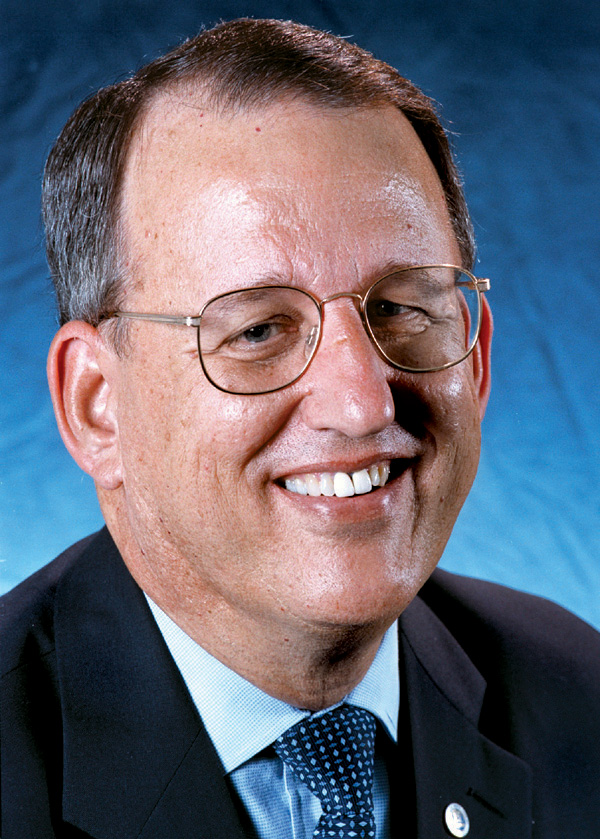‘I’ll Take My Turn’
Posted on July 15, 2012When his law school study group classmate William C. Friday ’48 (JD) called, William B. Aycock ’37 (MA, ’48 JD) was on leave teaching law in Virginia. Friday knew that his first selection for UNC’s chancellor was a pivotal decision. He was confident that Aycock was the right choice, and he was hopeful that the Johnston County native and former N.C. State College student body president would agree to become Carolina’s second chancellor. After reflection, Aycock responded by saying: “I’ll take my turn.”
And, seven years later — noting a provision of British law that someone missing for that span of time is presumed dead — Aycock called Friday to say he needed to return to the law faculty. “I don’t want my colleagues to presume that I’m deceased.”
As this magazine marks its centennial, we have been reflecting throughout 2012 on the history of this place, how it has been presented in these pages and about the people who have shaped UNC. Aycock served at the midpoint of that history, from 1957 to ’64, and is notable for leading Carolina through unusual challenges that are worth remembering today.
The Carolina campus had begun a period of rapid growth in the 1950s, both physically and in the size of the faculty and the student body. Working with Dean Reece Berryhill ’21 at the medical school, Aycock crafted a strategy to expand and manage what we now know as the UNC Health Care System. (The UNC Family Medicine Center now bears Aycock’s name.)
When the NCAA put Carolina’s athletics program on probation for recruiting violations in the men’s basketball program in 1960, Aycock responded quickly and firmly. He named a little-known assistant coach as the new head coach and made it clear to a young Dean Smith that he would judge him not by how many games were won but by whether he, his assistants and the players obeyed the rules.
The team struggled early in Smith’s tenure. One day, a couple of fans showed up at Aycock’s office. They expressed their displeasure with Smith and asserted that “if Coach Smith isn’t fired, we’ll no longer financially support the basketball program.” Aycock excused himself, returned a few minutes later and explained: “I’ve just extended Coach Smith’s contract by three years. Are we finished?”
And a most notable challenge: When, with no warning and no debate, the N.C. General Assembly passed the Speaker Ban Law in 1963, Aycock demonstrated the courage he showed as a battalion commander in the Battle of the Bulge in World War II, crisscrossing North Carolina, often appearing before hostile audiences to explain how harmful the ban was, not only for our campus but for all of North Carolina. “North Carolina has come a long way short on cash but long on freedom,” he said. “The Speaker Ban Law is a mistake. … It is a mighty blow against freedom.”
Aycock’s years as chancellor also were challenging physically. After stepping down, he collapsed one day from a bleeding ulcer and was rushed to Memorial Hospital. Several students hurried to the hospital and asked what they could do. They were encouraged to donate blood to help replace the hospital’s supply that had been used for Aycock. Upon learning what these students had done, Aycock penned them each a note of appreciation, calling them his “guardian angels.” A healthy Aycock returned to teaching and earned every teaching award available from the law school. And he has sent each of his “guardian angels” personal notes for nearly 50 years since.
Bill Aycock made his start as a teacher in a high school in Greensboro, later moving to Raleigh, where he met his wife, Grace, who received her master’s in social work from UNC in 1969, the same year their daughter, Nancy, and her husband, Daniel Leigh, graduated. Nancy then received her MSW in 1998 — the same year that Bill’s and Grace’s granddaughter Laura ’93 received her MSW from UNC. In more Carolina connections, Grace’s and Bill’s son, William P. Aycock ’65 (’70 JD) met his wife, Alexa ’66, at UNC, and along with daughter Laura, their son William B. Aycock II ’97 also is an alumnus. Presently, father and son practice law together in Greensboro.
Chancellor Aycock will celebrate his 97th birthday in October. His mind remains sharp, he listens avidly to Carolina football, basketball and baseball games, and one of my inspiring joys is to visit with him from time to time. Each visit prompts me again to be grateful that Bill Aycock decided to take his turn.
Yours at Carolina,

Douglas S. Dibbert ’70
Beginning in late 1995, the Review published a series of articles about the lives and times of our chancellors, and in 2005 the magazine revisited the Speaker Ban and Aycock’s role. This coverage is available online and includes “Grit and Freedom: The Legacy of William B. Aycock ’37 , a 1996 profile of Aycock; “With No Warning, No Debate,” the magazine’s 2005 coverage of the Speaker Ban; and Aycock’s Speaker Ban speeches: “The Speaker Ban Law,” to the UNC Board of Trustees, Oct. 28, 1963; “The Law and the University,” to the Greensboro Bar Association, Nov. 21, 1963; “Laws Affecting Speaking,” to the Watauga Club, Raleigh, Jan. 21, 1964; and “Statement in Opposition to the Speaker Ban Law,” to the Speaker Ban Law Study Commission, Sept. 8, 1965.

